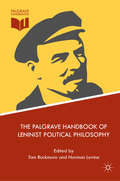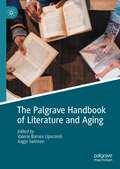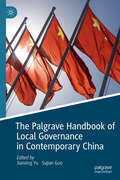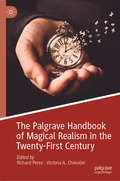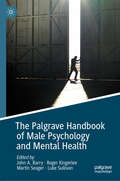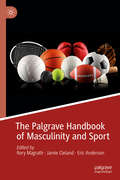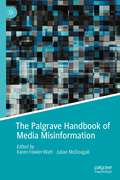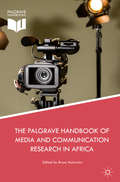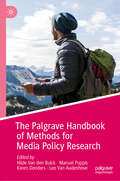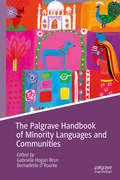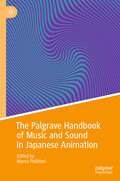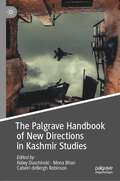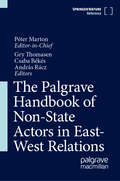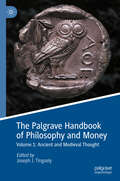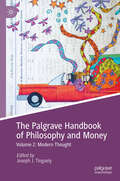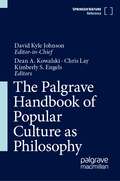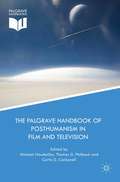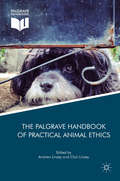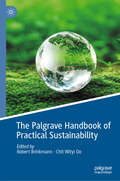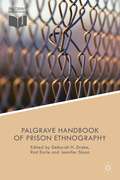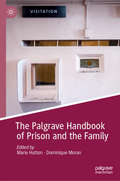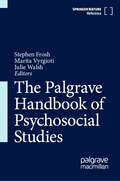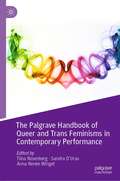- Table View
- List View
The Palgrave Handbook of Leninist Political Philosophy
by Norman Levine Tom RockmoreThis intellectually discomfiting, disturbingly provocative, yet still thoroughly scholarly Handbook reproduces the intellectual ferment that accompanied the Russian Revolution including the wholly polarising effect at that time of Vladimir Ilyich Lenin. The Palgrave Handbook of Leninist Political Philosophy does not settle for one safe interpretation of the thought of this world-historic figure but rather revels in a clash of viewpoints. Most interestingly it presents a contrast between the Western editors who emphasise pure democracy and Marxian humanism with many of the contributing scholars who take a more sanguine view of the Leninist political project. Perhaps reflecting the current Western political crisis, some of the volume’s other European and North American scholars more closely align with their colleagues from the Global South. Key Features: · Places particular emphasis on the key elements of Lenin’s thought – the dictatorship of the proletariat (which is trenchantly defended), the nature of the dialectic and the New Economic Policy · Additional comprehensive coverage includes the theory of the party, Bolshevism, imperialism, and the class struggle in the countryside · Examines the relation of Lenin’s thought to the ideas of his most influential contemporaries (including Luxemburg, Stalin and Trotsky) as well as the most eminent thinker to interpret Lenin since his death – György Lukács This Handbook is essential reading for scholars, researchers and advanced students in political philosophy, political theory, the history of political ideas, economics, international relations and world history. It is also ideal for the general reader who wishes to understand some of the most powerful ideas that have shaped the modern world and that may yet shake the world again.
The Palgrave Handbook of Literature and Aging
by Valerie Barnes Lipscomb Aagje SwinnenThis handbook offers a comprehensive survey of the growing field of literary age studies and points to new directions in scholarly research. Divided into four sections, the volume reflects the current conversations in the field: intersections and intersectionalities, traveling concepts, methodological innovations, and archival inquiries. It encompasses the spectrum of critical approaches that literary age studies scholars employ, from environmental studies and postcolonial theory to critical race theory and queer studies. While close reading continues to be a mainstay of literary criticism, the handbook highlights alternative tools and routes in both data elicitation and analysis. The final part of the book shows the burgeoning interest in the field from literary scholars across historical periods, extending the scope of literary age studies beyond contemporary texts. This is an essential reference work for advanced students and scholars of literary studies, gerontology, age/aging studies, interdisciplinary studies and cultural studies.
The Palgrave Handbook of Local Governance in Contemporary China
by Sujian Guo Jianxing YuThis Handbook provides a comprehensive overview of local governance in China, and offers original analysis of key factors underpinning trends in this field drawing on the expertise of scholars both inside and outside China. It explores and analyzes the dynamic interaction and collaboration among multiple governmental and non-governmental actors and social sectors with an interest in the conduct of public affairs to address horizontal challenges faced by the local government, society, economy, and civil community and considers key issues such as governance in urban and rural areas, the impact of technology on governance and related issues of education, healthcare, environment and energy.As the result of a global and interdisciplinary collaboration of leading experts, this Handbook offers a cutting-edge insight into the characteristics, challenges and trends of local governance and emphasizes the promotion of good governance and democratic development in China.
The Palgrave Handbook of Magical Realism in the Twenty-First Century
by Richard Perez Victoria A. ChevalierThe Palgrave Handbook of Magical Realism in the Twenty-First Century examines magical realism in literatures from around the globe. Featuring twenty-seven essays written by leading scholars, this anthology argues that literary expressions of magical realism proliferate globally in the twenty-first century due to travel and migrations, the shrinking of time and space, and the growing encroachment of human life on nature. In this global context, magical realism addresses twenty-first-century politics, aesthetics, identity, and social/national formations where contact between and within cultures has exponentially increased, altering how communities and nations imagine themselves. This text assembles a group of critics throughout the world—the Americas, Europe, Africa, Asia, the Middle East, and Australia—who employ multiple theoretical approaches to examine the different ways magical realism in literature has transitioned to a global practice; thus, signaling a new stage in the history and development of the genre.
The Palgrave Handbook of Male Psychology and Mental Health
by Luke Sullivan John A. Barry Roger Kingerlee Martin SeagerThis Handbook represents the first concerted effort to understand male mental health in a way that facilitates a positive step forward in both theory and treatment. An alarming number of men experience serious mental health issues, as demonstrated by high rates of suicide and violent offending. Despite these problems, the study of male psychology has either been overlooked, or viewed as a problem of defective masculinity. This handbook brings together experts from across the world to discuss men’s mental health, from prenatal development, through childhood, adolescence, and fatherhood. Men and masculinity are explored from multiple perspectives including evolutionary, cross-cultural, cognitive, biological, developmental, and existential viewpoints, with a focus on practical suggestions and demonstrations of successful clinical work with men.Throughout, chapters question existing models of understanding and treating men’s mental health and explore new approaches, theories and interventions. This definitive handbook encapsulates a new wave of positive theory and practice in the field of male psychology and will be of great value to professionals, academics, and those working with males through the lifespan in any sector related to male mental health and wellbeing.
The Palgrave Handbook of Masculinity and Sport
by Eric Anderson Jamie Cleland Rory MagrathOver the past two decades there has been a rapid transformation of masculinities in the West, largely facilitated by a decline in cultural homophobia. The significant changes in the expression of masculinity, particularly among younger generations of men, have been particularly evident in men’s team sports, which have become an increasingly diverse and inclusive culture. Drawing upon work from a wide range of established and emerging international scholars, this handbook provides a comprehensive and interdisciplinary analysis of the contemporary relationship between masculinity and sport. It covers a range of areas including history, media, gender, sexuality, race, violence, and fandom, considering how they impact a range of different sports across the world. Students and scholars across many disciplines will find the unparalleled overview provided by these specially commissioned chapters an invaluable resource.
The Palgrave Handbook of Media Misinformation
by Julian McDougall Karen Fowler-WattThe Palgrave Handbook of Media Misinformation provides a comprehensive and cutting-edge resource on the critical debates surrounding fake news and misinformation online. Spanning all continents and linking academic, journalistic, and educational communities, this collection offers authoritative coverage of conspiracy theories, the post-Trump and Brexit landscape, and the role of big tech in threats to democracy and free speech. The collection moves through a diagnosis of misinformation and its impacts on democracy and civic societies, the 'mainstreaming' of conspiracy theory, the impacts of misinformation on health and science, and the increasing significance of data visualization. Following these diagnoses, the handbook moves to responses from two communities of practice – the world of journalism and the field of media literacy.
The Palgrave Handbook of Media and Communication Research in Africa
by Bruce MutsvairoThis handbook attempts to fill the gap in empirical scholarship of media and communication research in Africa, from an Africanist perspective. The collection draws on expert knowledge of key media and communication scholars in Africa and the diaspora, offering a counter-narrative to existing Western and Eurocentric discourses of knowledge-production. As the decolonial turn takes centre stage across Africa, this collection further rethinks media and communication research in a post-colonial setting and provides empirical evidence as to why some of the methods conceptualised in Europe will not work in Africa. The result is a thorough appraisal of the current threats, challenges and opportunities facing the discipline on the continent.
The Palgrave Handbook of Methods for Media Policy Research
by Karen Donders Manuel Puppis Hilde Van den Bulck Leo Van AudenhoveThe Palgrave Handbook of Methods for Media Policy Research covers the craft that is and the methods used in media and communication policy research. It discusses the steps involved in conducting research, from deciding on a topic, to writing a report and everything in between and, furthermore, deals with a wide variety of qualitative and quantitative methods of data collection and analysis. The handbook invites researchers to rediscover trusted methods such as document analysis, elite interviews and comparisons, as well as to familiarize themselves with newer methods like experiments, big data and network analysis. For each method, the handbook provides a practical step-by-step guide and case studies that help readers in using that method in their own research. The methods discussed are useful for all areas of media and communication policy research, for research concerning the governance of both mass media and online platforms, and for policy issues around the globe. As such, the handbook is an invaluable guide to every researcher in this field.
The Palgrave Handbook of Minority Languages and Communities
by Gabrielle Hogan-Brun Bernadette O’RourkeThis Handbook is an in-depth appraisal of the field of minority languages and communities today. It presents a wide-ranging, coherent picture of the main topics, with key contributions from international specialists in sociolinguistics, policy studies, sociology, anthropology and law. Individual chapters are grouped together in themes, covering regional, non-territorial and migratory language settings across the world. It is the essential reference work for specialist researchers, scholars in ancillary disciplines, research and coursework students, public agencies and anyone interested in language diversity, multilingualism and migration.
The Palgrave Handbook of Music and Sound in Japanese Animation (Palgrave Studies in Sound)
by Marco PellitteriThis handbook fills a substantial gap in the international academic literature on animation at large, on music studies, and on the aural dimensions of Japanese animation more specifically. It offers a unique contribution at the intersection between music and popular culture studies on the one hand, and research on Japanese animated productions (often called ‘anime’) as popular art forms and formats of entertainment, on the other. The book is designed as a reference work consisting of an organic sequence of theory-grounded essays on the development of music, sounds, and voices in Japanese animation for cinema and television since the 1930s. Each chapter deals with a phase of this history, focusing on composers and performers, films, series, and genres used in the soundtracks for animations made in Japan. The chapters also offer valuable interviews with prominent figures of music in Japanese animation, as well as chapter boxes clarifying specific aspects.
The Palgrave Handbook of New Directions in Kashmir Studies
by Mona Bhan Haley Duschinski Cabeiri DeBergh RobinsonThe Palgrave Handbook of New Directions in Kashmir Studies provides a comprehensive, interdisciplinary and transregional perspective on the Kashmir dispute. Spanning South and Central Asia, Kashmir has been at the center of geopolitical conflicts and rivalries among India, Pakistan and China for decades, with members of heterogeneous local communities negotiating the complexities of regional state formations, national power assertions and geopolitical competitions. Taken together, the chapters in this handbook examine diverse people’s struggles to establish processes of democratic accountability in relation to the colonial-era state consolidations, postcolonial military occupations, interstate wars, intrastate armed conflicts and cold war and post-cold war politics that have shaped and transformed social and political identities in the region. Contributors chart out varied and bold new directions by attending to local constellations of situated knowledges and practices through which people living in different parts of the disputed region make sense of the conditions and contingencies of their political lives. The handbook further initiates a dialogue on the ways in which state power and border regimes have shaped scholarship and undermined the pursuit of shared intellectual and political projects across physical and epistemological boundaries.
The Palgrave Handbook of Non-State Actors in East-West Relations
by Péter MartonThe Handbook introduces to readers (accessibly for specialist and non-specialist scholars, students and layman audiences) the diverse universe of non-state actors (NSAs) that have played or are currently playing a significant role in the context of East-West relations (from 1945 to the present). With a view to the oft-seen political debates about which non- state actors may be independent or controlled by particular states, and in what ways they may be useful or harmful to the interests of particular actors, this volume is interested in analysing and assessing the relationship of NSAs to key state actors in the context of the politics of East-West relations. Key state actors in this context include more than just the United States (on the one hand) and the Soviet Union or Russia (on the other hand). To offer a structured overview, the volume explores possible typologies of the relationships conceivable between NSAs and states. New concepts and organising principles are presented, to support a process-tracing analysis of the evolution of proxy ships, partnerships and other types of connections between states and non-state actors. Degrees, sources and types of control and influence are considered. Further, the Handbook's chapters also examine NSAs’ impact on the dynamics of interstate conflict and cooperation in the East-West dimension. The systematic examination of the relationship between states and NSAs in East-West relations proposed here is the first undertaking of its kind. International scholarship in political science and strategic analyses have so far neglected to develop an analytical framework and a truly nuanced understanding that could capture the intricate and multilevel relationships that exists between NSAs and states in this context.
The Palgrave Handbook of Philosophy and Money: Volume 1: Ancient and Medieval Thought
by Joseph J. TinguelyThe Palgrave Handbook of Philosophy and Money surveys the role of money in the history of ideas. Volume 1: Ancient and Medieval Thought explores the worldviews of societies in the process of monetization. The volume is divided into sections on early Civilizations, classical Greece, the Roman era, and Medieval and Renaissance thought.
The Palgrave Handbook of Philosophy and Money: Volume 2: Modern Thought
by Joseph J. TinguelyThe Palgrave Handbook of Philosophy surveys the role of money in the history of ideas. Volume 2: Modern Thought examines the treatment of money in the writings of philosophers from the emergence of capitalism through the 20th century. The volume is divided into sections on Early Modernity, Late Modernity, and the Twentieth Century. Volume 2 presents an alternative history of modern philosophy in which monetary relations are both an explicit theme and an implicit condition of philosophical reflection.
The Palgrave Handbook of Popular Culture as Philosophy
by David Kyle JohnsonMuch philosophical work on pop culture apologises for its use; using popular culture is a necessary evil, something merely useful for reaching the masses with important philosophical arguments. But works of pop culture are important in their own right--they shape worldviews, inspire ideas, change minds. We wouldn't baulk at a book dedicated to examining the philosophy of The Great Gatsby or 1984--why aren't Star Trek and Superman fair game as well? After all, when produced, the former were considered pop culture just as much as the latter. This will be the first major reference work to right that wrong, gathering together entries on film, television, games, graphic novels and comedy, and officially recognizing the importance of the field. It will be the go-to resource for students and researchers in philosophy, culture, media and communications, English and history and will act as a springboard to introduce the reader to the other key literature inthe field.
The Palgrave Handbook of Posthumanism in Film and Television
by Michael Hauskeller Thomas D. Philbeck Curtis D. CarbonellWhat does popular culture's relationship with cyborgs, robots, vampires and zombies tell us about being human? Insightful scholarly perspectives shine a light on how film and television evince and portray the philosophical roots, the social ramifications and the future visions of a posthumanist world.
The Palgrave Handbook of Power, Gender, and Psychology
by Rose Capdevila Eileen L. ZurbriggenThe Palgrave Handbook of Power, Gender, and Psychology takes an intersectional feminist approach to the exploration of psychology and gender through a lens of power. The invisibility of power in psychological research and theorizing has been critiqued by scholars from many perspectives both within and outside the discipline. This volume addresses that gap. The handbook centers power in the analysis of gender, but does so specifically in relation to psychological theory, research, and praxis. Gathering the work of sixty authors from different geographies, career stages, psychological sub-disciplines, methodologies, and experiences, the handbook showcases creativity in approach, and diversity of perspective. The result is a work featuring a chorus of different voices, including diverse understandings of feminisms and power. Ultimately, the handbook presents a case for the importance of intersectionality and power for any feminist psychological endeavor.
The Palgrave Handbook of Practical Animal Ethics (The Palgrave Macmillan Animal Ethics Series)
by Andrew Linzey Clair LinzeyThis handbook provides an in-depth examination of the practical and theoretical issues within the emerging field of animal ethics. Leading experts from around the globe offer insights into cutting edge topics as diverse as killing for food, religious slaughter, animal companions, aquariums, genetic manipulation, hunting for sport and bullfighting. Including contributions from Lisa Johnson on the themes of human dominance, Thomas White on the ethics of captivity, Mark Bernstein on the ethics of killing and Kay Peggs on the causation of suffering, this handbook offers an authoritative reference work for contemporary applied animal ethics. Progressive in approach, the authors explore the challenges that animal ethics poses both conceptually and practically to traditional understandings of human–animal relations. Key Features: · Structured in four parts to examine the ethics of control, the ethics of captivity, the ethics of killing and the ethics of causing suffering · Interdisciplinary approach including philosophical, historical, scientific, legal, anthropological, religious, psychological and sociological perspectives · Focussed treatment of practical issues such as animals in farming, zoos and animal experimentation The Palgrave Handbook of Practical Animal Ethics is an essential resource for those with an interest in the ethics of modern-day treatment of animals as well as scholars, researchers and advanced students in zoology, philosophy, anthropology, religious studies and sociology.
The Palgrave Handbook of Practical Sustainability
by Robert Brinkmann Chit Wityi OoThis book provides a comprehensive look at practical sustainability around the world. The book takes a distinctly regional, case study perspective and highlights different approaches to managing sustainability challenges. Chapters by authors from all corners of the world look at a range of sustainability issues including environmental sustainability, environmental equity and justice, and government and business approaches to sustainability. The authorship of the book is distinctly global which provides an important perspective to this volume. Each chapter focuses on a different sustainability problem and how it was addressed in the region. Readers will take away a tremendous amount of information as to how sustainability challenges are addressed by leaders throughout the globe.
The Palgrave Handbook of Prison Design (Palgrave Studies in Prisons and Penology)
by Yvonne Jewkes Dominique Moran Kwan-Lamar Blount-Hill Victor St. JohnThis handbook brings together expertise from a range of disciplinary perspectives and geographical contexts to address a key question facing prison policymakers, architects and designers – what kind of carceral environments foster wellbeing, i.e. deliver a rehabilitative, therapeutic environment, or other ‘positive’ outcomes? The Palgrave Handbook of Prison Design offers insights into the construction of custodial facilities, alongside consideration of the critical questions any policymaker should ask in commissioning the building of a site for human containment. Chapters present experience from Australia, Chile, Estonia, Ireland, New Zealand, Norway, Russia, the United Kingdom, and the United States – jurisdictions which vary widely in terms of the history and development of their prison systems, their punitive philosophies, and the nature of their public discourse about the role and purpose of imprisonment, to offer readers theories, frameworks, historical accounts, design approaches, methodological strategies, empirical research, and practical approaches.
The Palgrave Handbook of Prison Ethnography
by Deborah H. Drake Rod Earle Jennifer SloanWith a foreword by Professor Yvonne Jewkes, University of Leicester, UK. ThePalgrave Handbook of Prison Ethnography provides an expansive overview of the challenges presented by qualitative, and particularly ethnographic, enquiry. The chapters reflect upon the means by which ethnographers aim to gain understanding, make sense of what they learn and the way they represent their finished work. The Handbook offers urgent insights relevant to current trends in the growth of imprisonment worldwide. In an era of mass incarceration, human-centric ethnography provides an important counter to quantitative analysis and the audit culture on which prisons are frequently judged. The Handbook is divided into four parts. Part I ('About Prison Ethnography') assesses methodological, theoretical and pragmatic issues related to the use of ethnographic and qualitative enquiry in prisons. Part II ('Through Prison Ethnography') considers the significance of ethnographic insights in terms of wider social or political concerns. Part III ('Of Prison Ethnography') analyses different aspects of the roles ethnographers take and how they negotiate their research settings. Part IV ('For Prison Ethnography') includes contributions that convincingly extend the value of prison ethnography beyond the prison itself. Bringing together contributions by some of the world's leading scholars in criminology and prison studies, this authoritative volume maps out new directions for future research. It will be an indispensable resource for practitioners, students, academics and researchers who use qualitative social research methods to further their understanding of prisons.
The Palgrave Handbook of Prison and the Family (Palgrave Studies in Prisons and Penology)
by Dominique Moran Marie HuttonThis handbook brings together the international research focussing on prisoners’ families and the impact of imprisonment on them. Under-researched and under-theorised in the realm of scholarship on imprisonment, this handbook encompasses a broad range of original, interdisciplinary and cross-national research. This volume includes the experiences of those from countries often unrepresented in the prisoner’s families’ literature such as Russia, Australia, Israel and Canada. This broad coverage allows readers to consider how prisoners’ families are affected by imprisonment in countries embracing very different penal philosophies; ranging from the hyper-incarceration being experienced in the USA to the less punitive, more welfare-orientated practices under Scandinavian ‘exceptionalism’. Chapters are contributed by scholars from numerous and diverse disciplines ranging from law, nursing, criminology, psychology, human geography, and education studies. Furthermore, contributions span various methodological and epistemological approaches with important contributions from NGOs working in this area at a national and supranational level. The Palgrave Handbook of Prison and the Family makes a significant contribution to knowledge about who prisoners’ families are and what this status means in practice. It also recognises the autonomy and value of prisoners’ families as a research subject in their own right.
The Palgrave Handbook of Psychosocial Studies
by Stephen Frosh Julie Walsh Marita VyrgiotiOver the past decades, psychosocial studies has demonstrated its strengths and influence across diverse sites of theory and practice; it continues to grow as an area of transdisciplinary research that dialogues with psychoanalysis, sociology, critical psychology, cultural studies, gender and sexuality studies, and postcolonial studies. The Palgrave Handbook of Psychosocial Studies is the first Major Reference Work to explore the history and depth of the field and offer a critical evaluation of contemporary theories, empirical methods and practices of psychosocial studies. With 50 chapters, this state-of-the-art collection:· reflects back on texts that have influenced the development of psychosocial studies from a 2020s perspective· explores current major topics with evaluative reviews· identifies newly emerging areas ofenquiry · features a wide range of international psychosocial voices. Published chapters can be read and downloaded individually online: https://link.springer.com/referencework/10.1007/978-3-030-61510-9 The Palgrave Handbook of Psychosocial Studies is unique in covering a wide range of psychosocial topics and in being written accessibly from many different perspectives. It will appeal to students, scholars and practitioner-researchers alike.
The Palgrave Handbook of Queer and Trans Feminisms in Contemporary Performance
by Tiina Rosenberg Sandra D’Urso Anna Renée WingetThe purpose of this Handbook is to provide students with an overview of key developments in queer and trans feminist theories and their significance to the field of contemporary performance studies. It presents new insights highlighting the ways in which rigid or punishing notions of gender, sexuality and race continue to flourish in systems of knowledge, faith and power which are relevant to a new generation of queer and trans feminist performers today.The guiding question for the Handbook is: How do queer and trans feminist theories enhance our understanding of developments in feminist performance today, and will this discussion give rise to new ways of theorizing contemporary performance? As such, the volume will survey a new generation of performers and theorists, as well as senior scholars, who engage and redefine the limits of performance. The chapters will demonstrate how intersectional, queer and trans feminist theoretical tools support new analyses of performance with a global focus. The primary audience will be students of theatre/ performance studies as well as queer /gender studies. The volume’s contents suggest close links between the formation of queer feminist identities alongside recent key political developments with transnational resonances. Furthermore, the emergence of new queer and trans feminist epistemologies prompts a reorientation regarding performance and identities in a 21st-century context.
